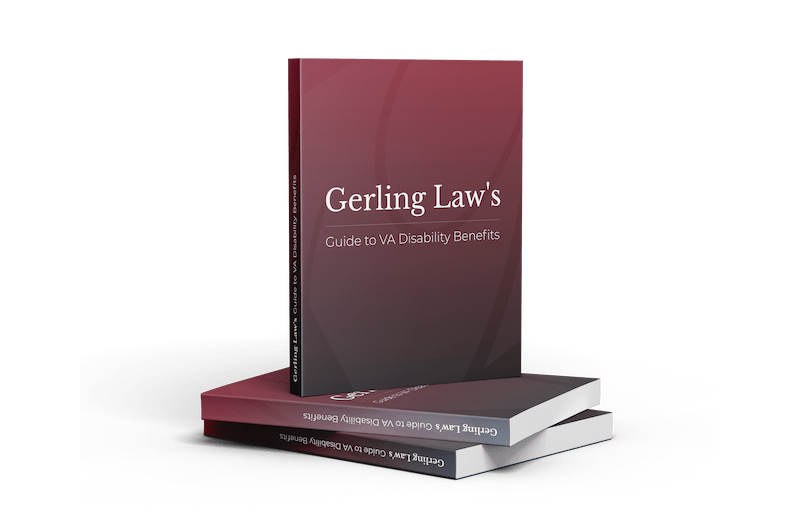Countless veterans experience mental health issues after their service. In fact, according to one 2016 study, more than 1.1 million Veterans who were treated between 2010 and 2011 in a VA Patient Aligned Care Team (PACT) were diagnosed with at least one of five severe mental health issues, one of which was bipolar disorder.
Suffering from bipolar disorder can affect nearly every area of everyday life. And when bipolar disorder prevents a veteran from gaining or keeping gainful employment, that veteran may be eligible for disability benefits through the VA.
However, bipolar disorder is a complicated condition. Sometimes this leads to the VA giving veterans a lower bipolar VA rating than they deserve.
Many veterans wonder what their chances of getting VA disability for bipolar disorder are. And while this can often be difficult to ascertain, our team is here to help. Use our guide below to learn more about the bipolar disorder VA rating system and see how our VA disability lawyers can help.
What Is Bipolar Disorder?
Bipolar disorder is a mental health condition known for causing extreme mood swings that include emotional highs, known as mania or hypomania, and emotional lows, known as depression. The mood swings can affect sleep, energy, activity, judgment, behavior, and the ability to think clearly.
Common symptoms of bipolar disorder include:
- Periods of unusually intense emotion,
- Changes in sleep patterns,
- Changes in activity levels,
- Extreme mood swings, and
- Uncharacteristic behaviors.
If you’ve experienced these or other similar symptoms following your military service, be sure to seek a diagnosis from a medical professional as soon as practicable.
How Much Disability for Bipolar Disorder Will I Receive?
To determine what disability benefits you may be able to receive in connection with your bipolar disorder, you’ll first need to have your bipolar VA rating determined.
People often wonder whether there is an average VA rating for bipolar disorder. Unfortunately, there is no such average. Each veteran has different facts and circumstances surrounding their condition that may impact their resulting bipolar VA rating.
For this reason, the VA rates all mental health conditions, including bipolar disorder, on a graduated scale, using the General Rating Formula for Mental Disorders.
In accordance with 38 C.F.R. § 4.130, below are the definitions for the various disability rating levels for mental disorders.
100% Total Disability
The rating level covers total occupational and social impairment due to symptoms such as gross impairment in thought processes or communication; persistent delusions or hallucinations; grossly inappropriate behavior; persistent danger of hurting self or others; intermittent inability to perform activities of daily living (including maintenance of minimal personal hygiene); disorientation to time or place; and memory loss for names of close relatives, own occupation, or own name.
70% Disability
This level addresses occupational and social impairment, with deficiencies in most areas, such as work, school, family relations, judgment, thinking, or mood.
Associated symptoms include suicidal ideation; obsessional rituals which interfere with routine activities; speech intermittently illogical, obscure, or irrelevant; near-continuous panic or depression affecting the ability to function independently, appropriately and effectively; impaired impulse control (such as unprovoked irritability with periods of violence); spatial disorientation; neglect of personal appearance and hygiene; difficulty in adapting to stressful circumstances (including work or a worklike setting); and inability to establish and maintain effective relationships.
50% Disability
This level of occupational and social impairment consists of reduced reliability and productivity due to such symptoms as flattened affect; circumstantial, circumlocutory, or stereotyped speech; panic attacks more than once a week; difficulty in understanding complex commands; impairment of short- and long-term memory (e.g., retention of only highly learned material, forgetting to complete tasks); impaired judgment; impaired abstract thinking; disturbances of motivation and mood; and difficulty in establishing and maintaining effective work and social relationships.
30% Disability
This level is characterized by occupational and social impairment with occasional decrease in work efficiency and intermittent periods of inability to perform occupational tasks (although generally functioning satisfactorily, with routine behavior, self-care, and conversation normal), due to such symptoms as depressed mood, anxiety, suspiciousness, panic attacks (weekly or less often), chronic sleep impairment, and mild memory loss (such as forgetting names, directions, recent events).
10% Disability
This level includes occupational and social impairment due to mild or transient symptoms that decrease work efficiency and ability to perform occupational tasks only during periods of significant stress or symptoms controlled by continuous medication.
0% Disability
When a mental condition has been formally diagnosed, but symptoms are not severe enough either to interfere with occupational and social functioning or to require continuous medication, a 0% rating is generally given.
To prove your level of disability and receive benefits, you must be able to meet one of the above definitions. Importantly, however, even if you have been formally diagnosed with bipolar disorder, there is still a possibility of receiving a rating of 0 if your symptoms are not severe enough.
How to Prove Your Bipolar VA Rating
So, how do you prove what your disability rating should be? In many cases, the best evidence will be medical records showing a diagnosis and treatment for your bipolar disorder while you were in service or shortly thereafter.
To obtain VA disability for bipolar disorder, you must do more than prove a bipolar disorder diagnosis and disability rating. You must also demonstrate a service-related connection to your current bipolar disorder diagnosis.
While this can all sound complicated, an experienced VA disability lawyer can help you gather the evidence you need to support your claim.
Contact Gerling Law to Discuss Your Bipolar VA Rating
When it comes to VA disability ratings, you deserve to have someone in your corner who will work diligently to get you the results and benefits you need and deserve. At Gerling Law, we will do everything we can to do just that.
If you are suffering from bipolar disorder in connection with your military service, we’re here to help. Whether you need assistance filing your claim, obtaining a higher rating, or disputing an unjustified denial, our VA disability attorneys will be there for you at every step along the way.
With more than 50 years of experience fighting for the rights of our clients, we are confident that we have what it takes to help you too. Contact our team online or call (888) 437-5464 today for a free case evaluation to discuss your case in more detail.
When you’re ready to get started, Go with Experience. Go with Gerling.®


